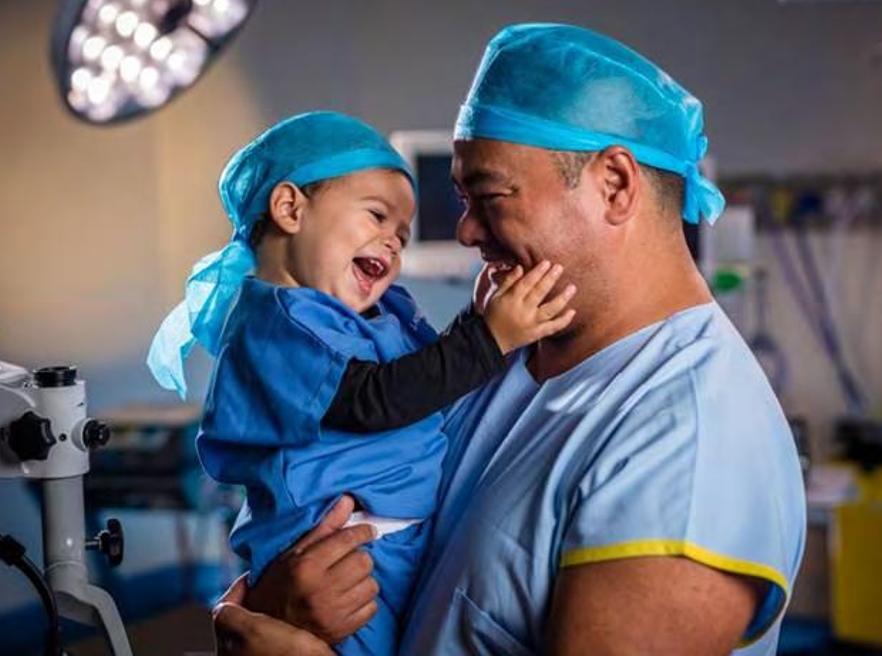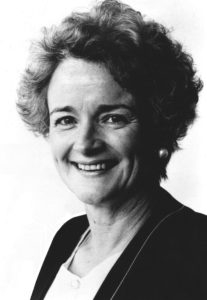March: Libby Harricks Memorial Address


Professor Kelvin Kong AM delivered the 25th Libby Harricks Memorial Address at Parliament House Canberra in March 2024.
Kelvin, a proud Worimi man, is Australia’s first indigenous ENT surgeon, and an inspiring advocate for hearing health. He was honoured as the NAIDOC Person of the Year in 2023. In 2024 he was awarded a Member of the Order of Australia for his work with Indigenous children at risk of hearing loss.
“Australia still has the worst ear disease rates in the world. Chronic suppurative otitis media affects from 40% to 85% of children in Indigenous communities,” Professor Kong said.
Since the first Libby Harricks Memorial Address in 1999, the series has featured renowned speakers worldwide and gained international recognition for its exceptional presentations on important hearing health and advocacy issues.
The series honours the memory of the late Libby Harricks AM, the first President of Deafness Forum Australia. Libby was made a Member of the Order of Australia in 1990 for her work on behalf of deaf and hard-of-hearing people. Libby worked tirelessly to raise awareness of the need for equal inclusion in life activities for all people with hearing challenges. Her legacy continues through this annual event.
The purpose of the series:
- Informing political and sector opinion and policy: By featuring high-profile speakers and addressing critical topics, the series can shape the conversation and advocate for necessary changes in the field.
- Educational purposes: Orations serve as a platform for disseminating new ideas, research, insights, and advancements in the field.
- Networking and relationship building: Orations provide opportunities for professionals and consumer representatives in the field to network.
- Showcasing Leadership in Advocacy: The series helps demonstrate the Deafness Forum’s role as a leader in the field of advocacy.
An Elegant Solution
(2023) Professor Jim Patrick AO, Chief Scientist, Professor Emeritus, Cochlear. Jim Patrick is a world authority on cochlear implants, one of the original team that pioneered the development of the multi-channel cochlear implant. He has also been involved in several projects that seek to use Cochlear technology in other medical bionics fields. These include the treatment of spinal cord injuries, the use of an implanted stimulator to provide sensory feedback for people using artificial hands and the use of an implanted stimulator to provide ‘pacing’ vestibular stimulation to relieve Menieres symptoms. Jim retired from Cochlear in December 2016 but continues to contribute in an Emeritus role. Watch his video.
Listening to the Future – Is Prevention Better than Cure?
(2022) Dr David McAlpine is Distinguished Professor of Hearing, Language & The Brain, the Department of Linguistics, and Academic Director of Macquarie University Hearing, Faculty of Medicine, Health and Human Sciences at The Australian Hearing Hub, Macquarie University in Sydney Australia. Click to download Prof David McAlpine’s 23rd Libby Harricks Memorial Address presentation.
Indigenous Ear and Hearing Health — Tackling the Silent Epidemic
(2021) Professor Harvey Coates AO presented the 2021 Libby Harricks Memorial Address in a webcast in March from Perth in Western Australia. Watch the presentation here.
The COVID-19 health pandemic paused the series in 2020.
Global Hearing Health: challenges and opportunities
(2019) Professor Andrew Smith’s presentation to the Indigenous Hearing Health Symposium, Australian Hearing Hub, Sydney. >>
Sisters are doin’ it for themselves
(2018) Dr Graeme Innes AM at the 23rd Audiology Australia National Conference, Sydney. >>
Hearing and Mind: What should we do about hearing loss to promote cognitive wellbeing in older age?
(2017) Piers Dawes’ presentation to the 17th Alzheimer’s Australia Biennial National Dementia Conference, Melbourne. >>
18th Libby Harricks Memorial Oration by former Prime Minister John Howard
(2016) The Honourable John Howard OM AC, 25th Prime Minister of Australia presented his Address at the 9th National Deafness Summit, Sydney. >>
Towards a new model for the deaf inclusion of leadership in early hearing detection and intervention services
(2015) Dr Christine Yoshinago-Itano (8th Australasian Newborn Hearing Screening Conference, Sydney). >>
Making connections
(2014) Prof Susan Brumby (XXXII World Audiology Congress, Brisbane). >>
The consequences of being born Deaf in the 21st Century
(2013) Dr Laurie S Eisenberg (Australian Hearing Hub Inaugural Conference, Sydney). >>
A report card on the social wellbeing of Deaf and hearing-impaired people in Australia
(2012) Dr Anthony Hogan (7th National Deafness Sector Summit, Melbourne). >>
Molecules, managers or mentors: how can we minimise noise damage in the workplace
(2011) Dr Robert Patuzzi (11th National Rural Health Conference, Perth). >>
Early identification of hearing impairment in Australia: Well begun is not all done
(2010) Professor Greg Leigh (6th National Deafness Sector Summit, Sydney). >>
The bionic ear: from an idea to reality
(2009) Professor Graeme Clark AC (General Practice Continuing Education conference, Sydney). >>
Access, equity and hearing loss in Australia in 2008
(2008) Professor Bob Cowan (5th National Deafness Sector Summit, Canberra). >>
Hearing and communication: a primary concern in aged care
(2007) Richard Osborn (9th Rural Health Conference, Albury NSW). >>
Hearing Loss: the silent epidemic. Who, why, impact and what can we do about it
(2006) Professor Harvey Dillon (4th National Deafness Sector Summit, Perth). >>
Deafness and disability transformed: an empowering personal context.
(2005) Alex Jones (Blue Mountains conference, NSW). >>
A sorry business: lack of progress in Aboriginal hearing health
(2004) Dr Peter Carter (3rd National Deafness Sector Summit, Brisbane). >>
Disability law and people with hearing loss: we’ve come a long way but not there yet
(2003) Donna Lee Sorkin (Macquarie University, Sydney). >>
The prevalence, risk factors and impacts of hearing impairment in an older Australian community
(2002) Professor Paul Mitchell (XXVI International Conference of Audiology, Melbourne). >>
The Politics of Deafness
(2001) Senator the Honorable Margaret Reid (National Press Club, Canberra). >>
Recent advances in the understanding of Meniere’s disease and tinnitus
(2000) Professor William P R Gibson AM (International Federation of Hard of Hearing Conference, Sydney). >>
The Inaugural Libby Harricks Memorial Address
(1999) Professor Di Yerbury AM (Sydney)
About Libby

The exceptional Libby Harricks, who, in spite of progressive hearing loss, accomplished so much in her advocacy for deaf and hard of hearing people, brings to mind Nelson Mandela’s statement:
“What counts in life is not the mere fact that we have lived. It is what difference we have made to the lives of others that will determine the significance of the life we lead.”
Libby Harricks grew up with apparently normal hearing. Subsequently, as a young wife and mother, she developed a profound hearing loss. She quickly educated herself with skills to manage her own hearing difficulties and soon became committed to advocating for all hearing impaired people.
Libby was the inaugural Chairperson of Deafness Forum Australia. In all of these purely voluntary roles, she worked tirelessly to raise awareness of the need for equal inclusion in life activities for deaf and hard of hearing people, even travelling widely throughout Australia to lobby for this on their behalf. In recognition of her advocacy work, Libby was made a Member of the Order of Australia in 1990.
After her passing in 1998, Deafness Forum Australia established the annual Libby Harricks Memorial Oration, later renamed Address, series to honour her achievements.
